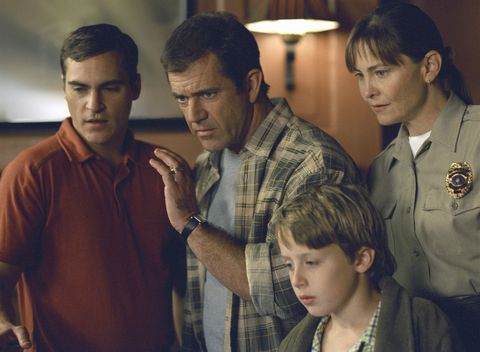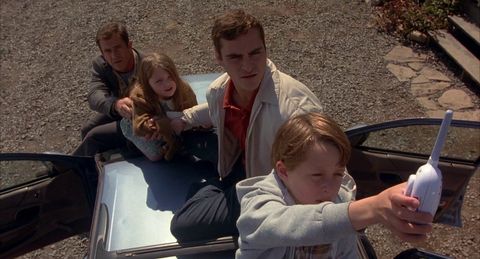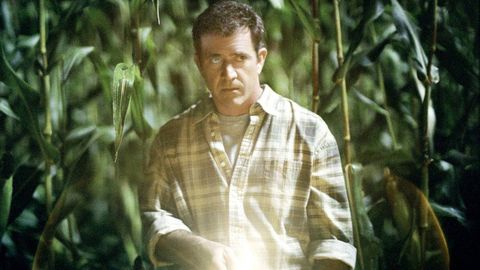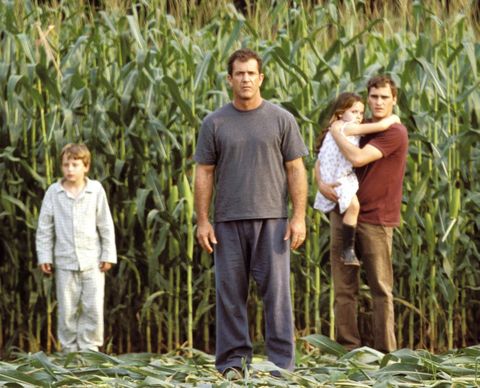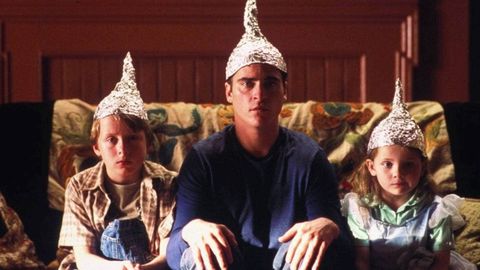If religion is the opium of the people, M. Night Shyamalan decided that he wanted to be the drug dealer that distributed it around the world. The price of the dose would be that of a movie ticket. The film, ‘Signs’, an intimate apocalypse that mixed a story of aliens with a treatise on faith. “It is as if a Christian television network had merged with the Sci-Fi channel”summed up the critic Peter Rainer in nyc magazine.
Now that he has just turned 20, we can say that ‘Signs’ is one of the peaks of Shyamalan’s zigzagging career. The ability of the director, still young at the time, to play with tension, mix tones, control emotion and save narrative resources make his fifth feature film a rare gem of science fiction and an emotional family drama. The performances of the cast, made up of Mel Gibson, Joaquin Phoenix, Cherry Jones and little Rory Culkin and Abigail Breslin, are absolutely perfect. The beautiful and epic music of James Newton Howard, with those atmospheric violins as protagonists, is among the best works of his (and could be among the best soundtracks in history). It has so many memorable scenes that it is difficult to choose just one: the family together in the car listening to the aliens through a monitor, the birthday sighting, the last supper, the final confrontation…
An inspiring and optimistic film after 9/11
And yet, it also marked the beginning of the end of the idyll of the general public with Shyamalan. After the commercial bombshell that was ‘The Sixth Sense’ and a misunderstood ‘The Protected’ that would take years to find its recognition, ‘Signs’ ended up positioning the director of Philadelphia as “the heavy of the final plot twists with surprise”, and also as an author whose films provoked opposing opinions. But above all, he is a storyteller at a time when few of us want to be told stories (something that he himself would make explicit in the prologue of ‘The girl from the water’, his most battered, rejected and undervalued film, but we will talk about that in another moment).
‘Signs’ grew out of Shyamalan’s intention to make an upbeat and inspiring film. The director came out of a time of restlessness and darkness, feelings that he first impressed on ‘El protege’ and then multiplied when he saw the lukewarm reception it received. Then one day he was in a restaurant and he looked around. “I saw a family that was eating in silence. I saw a couple eating in silence”he told in an interview with TheRinger in 2020. “I was thinking that I could make sad movies and I would be being honest. But I looked at these people, and I knew they were going to come see my movies, and I wanted to make them feel better. So I called up Disney and said, ‘I want to make a movie that’s happy, and doesn’t have that sad look. It can have a lot of conflict, but the voice, the point of view, I wanted it to be inspiring and even childish. And that’s how ‘Señales’ was born”.
Although it may seem the opposite, the need to make a hopeful film originally had nothing to do with the terrorist attacks of September 11, 2001. Released almost a year later, television broadcasts of the invasion of ‘Signals’ have seen as an allegorical representation of those iconic images of the fall of the Twin Towers. But in reality, the shooting of the film began just two days after 9/11, and the script, which was written years before, was respected almost to the letter during production.. Shooting it after a tragic event with such historical significance was nothing more than a coincidence (although, as the film itself asks, do coincidences exist?).
What did influence her was a certain spirit of fragility and communion that permeated American society in the months after the attacks. The first thing that was shot was the flashback in which Graham arrives at the scene of the accident and says goodbye to his wife before he dies. The crew took a photo just before the first shot of them holding candles. “It was a super exciting moment for everyone”Shyamalan has confessed. “I think part of the spirituality of the film came from the times we were living in then. We all felt vulnerable and grateful to be together, that our loved ones were okay, and we felt lucky on so many levels, randomly lucky.”.
Coincidentally or not, ‘Signs’ tells the story of a world transformation, a violent and tragic event that changes society as 9/11 did. The film opens and ends with the same image of the Grahams’ backyard, which Shyamalan has described as a postcard from Norman Rockwell, the artist known for his rural landscapes: “It’s a backyard with a swing set, with the wheat, and everything is perfect, the American ideal. And by the end of the movie, the American ideal has changed a little bit because the glass is broken, but it’s still pretty.”.
The story of a man who regains faith
Although many remember it as an alien movie, what really counts is the crisis of faith of a priest who, after the sudden death of his wife in a traffic accident, decides to hang up his cassock. This is not subtext, but text. Numerous references are made throughout the footage to Graham’s past (“Caroline, stop calling me ‘Father’”), a man who forbids his family to pray. One of the best scenes, Graham and Merrill’s late-night conversation on the couch, has a monologue that sums up what the movie is about:
“The world has two types of people and when something lucky happens, those in the first group consider it more than luck, more than chance, they consider it a sign. A proof that there is someone up there taking care of the human being. Other people consider it pure luck, a happy twist of chance. Surely the people in the second group are watching those 14 lights with suspicion. For them, the situation is half and half: it could go wrong or right. But deep down they feel that no matter what happens, they are alone. And that fills them with fear. Yes, that’s what they think. But then there are a lot of people in the first group who when they look at those lights they are seeing a miracle. And deep down they feel that no matter what happens there will be someone up there to help them. And that fills them with hope. What you should ask yourself is in which group are you: are you one of those who see signs, one of those who see miracles, or do you believe that people’s luck is random? Or, think of it this way: is it possible that coincidences do not exist?
The signs in the title seem to refer to the marks that aliens leave in fields around the world, but in reality they are those apparent coincidences that the film is full of, which end up coming together in a supposed master plan to save the family from Graham. Morgan’s asthma that closes his lungs so he doesn’t breathe in the alien’s poisonous gas, Merrill’s past as an extraordinary baseball player, Bo’s mindless mania for leaving full glasses of water all over the house, and even the death of the mother, who was taking a walk arbitrarily at the exact time and place where that neighbor went to sleep at the wheel. Graham listens to those apparently unconnected last words from his wife (“Tell Graham to watch. And tell Merrill to hit hard”) and thinks they are the result of the blackout of his mind, but he will end up making sense of them at the right moment, when Merrill face the alien with his bat and the water in the glasses is the key to defeat him.
Although ‘Señales’ has a great deal of Christian symbology (that is the religion of its protagonist, after all), it is not a film about God, but about faith. “I am not religious at all”Shyamalan explained. “The goal was not to support or promote a specific religion. The point is in that scene on the couch.”. If ‘Signs’ has a theological proposition, it does not dictate what we should believe, but it does encourage us to believe in something. If we do, says the filmmaker, we will believe in the idea that we have more will than we think. In his own words: “Are you going to see the glasses of water that are around you to save you at the specific moment if you are not open to see the glasses of water around you?”. For him, faith is nothing more than a way of giving meaning and significance to our lives.
Spirituality vs logic (and a criticized plot twist)
Shyamalan’s cinema in the 2000s is full of spirituality, optimism and sentimentality, perhaps the main culprits that the public ended up turning their back on him. The proof of this is that the films of his current stage marked by a reconciliation with the audience, which began with ‘The Visit’, are much cruder and more nihilistic and have much less sentimental charge. ‘Signs’, ‘The Forest’ and ‘The Girl in the Water’ are deeply romantic, moving and sensitive films (for many, sentimental), something that did not like even the studios that invested many millions of dollars in those films (and for this reason they designed advertising campaigns for them that were very unrepresentative of what they really counted) not much of the public (who often felt cheated by precisely those campaigns).
The famous script twist of ‘Signs’ is one of the clearest examples of that disconnection between Shyamalan and many viewers. What for the filmmaker was nothing more than a symbol of a spiritual and emotional theoretical framework, for the most cerebral audience it became a ridiculous and scandalous inconsistency that threw the entire film to the ground. They saw it as a script hole: how is a species that is mortally vulnerable to it going to try to invade a planet full of water? One could try to defend it in various ways, since we know almost nothing about the aliens, their intentions or their circumstances: they may have arrived on Earth desperate and with exhausted resources and had no other options, or they may not have been aware of that fact. weakness because perhaps they had never encountered this element, which after all does not seem to have much presence beyond our planet. But ultimately we would be approaching the film with an extreme preoccupation with something that Shyamalan cares little for: logic, with which much of the audience seems to be obsessed.
Premonition of the pandemic
‘Signs’ would be quite prescient of something that happened almost two decades later. When the coronavirus pandemic forced us to confine ourselves and filled our televisions with images never seen before, some films from the past returned with renewed force, such as ‘Contagion’ by Steven Soderbergh, ‘Extraterrestrial’ by Nacho Vigalondo or ‘Virus’, the film that He got ahead of the coronavirus. ‘Señales’ had not only portrayed ahead of time the experience of living through an apocalyptic event in the intimacy of the family home, but also warned of what happens when society faces an inexplicable event: the explosion of conspiracy thinking.
Throughout the film, different theories about the aliens are given, each one more delusional, to the point that Merrill and the children end up putting aluminum foil caps on their heads to prevent the invaders from reading their brains. The comical image has spread again in recent years as a representation of the collective hysteria that has arisen from the pandemic.
The idea of ’Signs’ about faith and destiny may be simplistic and naive, but ironically it has permeated much of society: Many are willing to see signs of “master plans” where there would only be chance and bad luck, and all the logic that applies to Shyamalan’s scripts goes out the window when we want to make sense of what happens in the real world. You know, the people need opium, and given the choice, I’m left with the ingenuity of M. Night Shyamalan.

